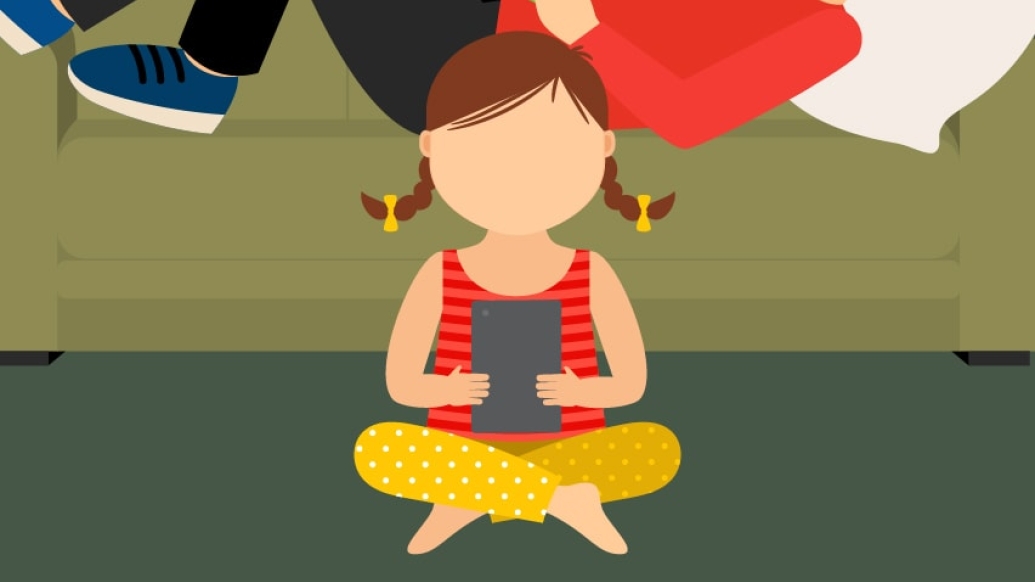Ninety-five percent of reviewed apps for children ages 5 and under include at least one form of advertising, a new U-M study finds. Why parents should pay attention.
11:00 AM
Author |

From games inspired by popular TV shows to digital play labeled as educational, children's apps continue to explode on smartphones and tablets.
LISTEN UP: Add the new Michigan Medicine News Break to your Alexa-enabled device, or subscribe to our daily audio updates on iTunes, Google Play and Stitcher.
But parents may not realize that while their little ones are learning letters and numbers or enjoying virtual adventures, they're also likely being targeted by advertisers.
Ninety-five percent of commonly downloaded apps marketed to or played by children 5 and under contain at least one type of advertising, according to a new study led by University of Michigan C.S. Mott Children's Hospital.
Published in the Journal of Developmental & Behavioral Pediatrics, the study reviewed 135 different apps — and it marks the first effort to examine the prevalence of advertising in children's apps.
Researchers found play was frequently interrupted by pop-up video ads, persuasion by commercial characters to make in-app purchases to enhance the game experience and overt banner ads that could be distracting, misleading and not always age-appropriate.
"With young children now using mobile devices on an average of one hour a day, it's important to understand how this type of commercial exposure may impact children's health and well-being," says senior author Jenny Radesky, M.D., a developmental behavioral expert and pediatrician at Mott.
Radesky notes that her team found high rates of mobile advertising through manipulative and disruptive methods — with exposure to ads even surpassing time spent playing the game in some cases.
"Our findings show that the early childhood app market is a wild west, with a lot of apps appearing more focused on making money than the child's play experience," she says. "This has important implications for advertising regulation, the ethics of child app design, as well as how parents discern which children's apps are worth downloading."
Ads target youngest players
Researchers detailed experiences with advertisements during gameplay of the most popular children's apps.
Although 100 percent of surveyed free apps contained advertising content (compared to 88 percent of purchased apps), the ads occurred at similar rates in both types of apps categorized as educational.
MORE FROM THE LAB: Subscribe to our weekly newsletter
Ad videos interrupting play were prevalent in more than a third of all analyzed apps and in more than half of free apps. In-app purchases were also present in a third of all apps, and in 41 percent of all free apps.
This discrepancy worries Radesky. "I'm concerned about digital disparities," she says. "Children from lower-income families are more likely to play free apps, which are packed with more distracting and persuasive ads."
Digital-based advertising is more personalized, on-demand and embedded within interactive mobile devices, and children may think it's just part of the game.Jenny Radesky, M.D.
Some ads were particularly deceptive: Familiar commercial characters would appear on-screen to remind players that paying for certain in-app upgrades and purchases would give them access to more appealing options and make the game more fun.
Overt banner ads covering the sides or top and/or bottom of the screen during gameplay were also present in 17 percent of all apps and 27 percent of free apps. Some banners promoted adult-appropriate apps that required a user to watch the full promo before a box could be closed.
Authors note that prior research has found children ages 8 and younger can't distinguish between media content and advertising — and that fewer regulations apply to advertising in apps than on television — which raises further ethical questions around the practice.
"Commercial influences may negatively impact children's play and creativity," Radesky says. "Digital-based advertising is more personalized, on-demand and embedded within interactive mobile devices, and children may think it's just part of the game."
Youths' privacy at risk
Researchers also documented prompts within the apps to share information, most commonly asking players to share their progress or score on social media sites.
SEE ALSO: Can Parents' Tech Obsessions Contribute to a Child's Bad Behavior
However, 17 of the apps reviewed requested phone permission, 11 asked for microphone permission, nine asked for camera permission and six requested location permission.
While some of the permissions were likely requested to allow certain functions during play, authors point out that collecting data on a child's location is a potential violation of the Children's Online Privacy Protection Act. The law, managed by the Federal Trade Commission, was created to protect the privacy of children under 13.
TV advertising regulations also limit commercial breaks during viewing segments, but there are no regulations focused on digital advertising approaches for children.
There is also growing concern among pediatricians and other experts that low-quality content and distracting visual and sound effects in popular apps may not be designed appropriately for children to learn, says Marisa Meyer, the study's lead author.
That prevalence also diminishes the educational quality of apps, she says.
"We know that time on mobile devices is displacing time children used to spend watching TV," says Meyer, research assistant at the U-M Medical School. "Parents may view apps that are marketed as educational as harmless and even beneficial to their child's learning and development."
The findings, Meyer says, suggest the need for heightened scrutiny of apps in the educational category.
"We hope further research will help us better understand the consequences of digital media advertisement, which hasn't caught up with the rapid growth of digital media products catered to children," she says.
More than 19 child consumer advocacy groups, led by Campaign for a Commercial Free Childhood and the Center for Digital Democracy, filed a complaint with the Federal Trade Commission about the study's findings.
The groups called on the FTC to hold app makers accountable for unfair and deceptive practices, including falsely marketing apps that require in-app purchases as "free" and manipulating children to watch ads and make purchases.

Explore a variety of health care news & stories by visiting the Health Lab home page for more articles.

Department of Communication at Michigan Medicine
Want top health & research news weekly? Sign up for Health Lab’s newsletters today!





